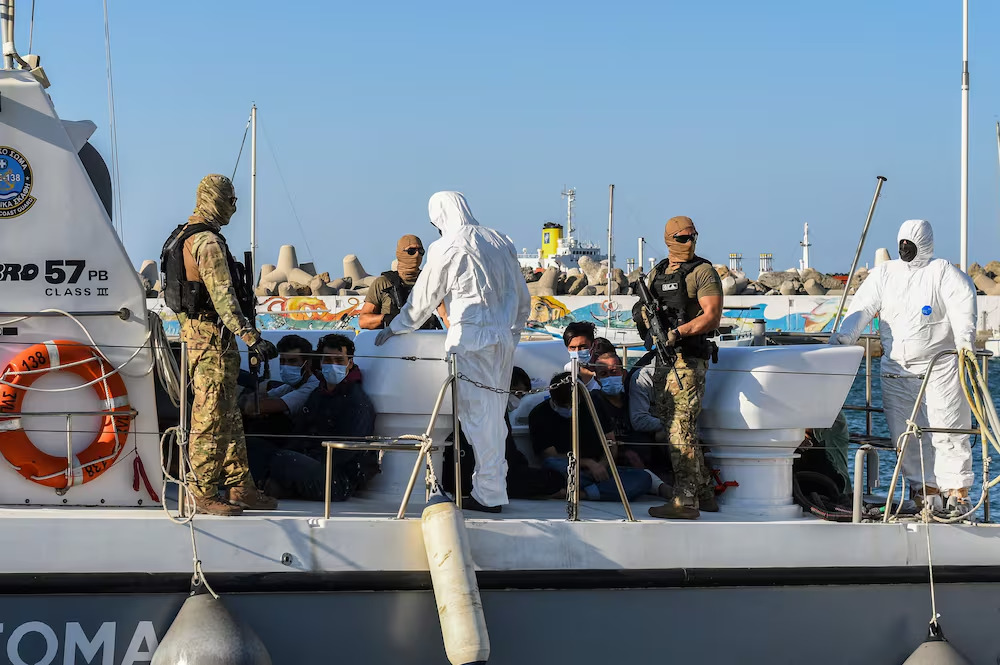"When it comes to a humanitarian crisis, Europe should add that it has a legal obligation"
- Conflicts in the Middle East and North Africa are forcing thousands of people to flee in search of safer territories, but when it comes to asylum the European Union watches them with suspicion, often in breach of their ethical and legal obligations. II. We asked Agustín Unzurrunzaga, an expert on migration and a member of SOS Racism, about the mass exodus we have experienced since the World War.

Macedonia has recently declared a state of emergency for the number of refugees, according to UNHCR and the UN, which this year has reached the European Union about 180,000 people to Serbia and another 265,000 to the shores of the Mediterranean. To what extent is all this unusual to give a dimension to the current situation?
We are facing a major crisis. But Europe’s tendency is to say that we are facing a humanitarian crisis and that it is up to it to give humanitarian aid, to which must be added the legal obligation that Europe has many agreements signed and approved internationally. It has commitments in the Declaration of Human Rights, in the Geneva Agreement of 1951 … linked to the international asylum and protection system, and often does not comply with them.
The European Union bears the Dublin II regulation, but it does not have a common asylum system, and that is a big problem. We have long been denouncing the Dublin II system, because it does not respect the will of the people: the demand for human rights tells us that everyone has the right to decide where to ask for asylum, but without a unified system, within that regulation the refugee asks for asylum in the country of destination, for example, if he comes to Greece he must stay and wait, knowing that administrative issues last for years, and that the procedures of each country are very different. At present, the incoming has no legal certainty that will guarantee equal treatment in all EU countries.
Indeed, Merkel and Hollande have agreed to defend the need for a common policy, which is not unitary policy. There has also been a responsible discussion of the need for quotas to relocate refugees… but after the deaths of 1,400 migrants in the Mediterranean last April, the same things were heard by the authorities, and what was subsequently agreed was to increase border control and increase barriers to people’s mobility; they were not even finally able to establish the quotas of the people that each country should receive.
Yes, they have been repeating the same thing for years. I have read an article by François Hollande in 2009 calling for a unified asylum system, legal certainty, etc. We have had to experience a crisis like this in order to re-remove the waters. Germany has been agitated because most people want asylum there, and they are concerned about the involvement of France and Germany and the progress that can be made.
Enough progress to respond to the crisis?
They would surely fall short, bearing in mind that they have begun to take decisions when the problem has erupted, rather than taking action beforehand. It is about putting Dublin II on its feet and making a commitment to a unified system, and taking into account how Europe works, the process will last for two or three years.
Merkel and Hollande want to set up registration centres so that "those who do not meet the requirements" can return to their home countries as soon as possible.
Yes, they want to make a clear distinction between those who need asylum or protection and the rest, and that is a speech to be right in front of a part of the local population, “we will take those who need protection, the other wood”, but in practice that is often not easy. If it comes from a place at war, it is clearer, but what happens if it comes from a neighbouring country that has been left in misery?
Should this distinction be made?
No. People migrate because it's wrong in their hometown. Sometimes because there is war, sometimes because it is urgent, sometimes because there is no future… There is often a mixture of many factors and making a distinction is sterile, although it is true that the law requires that international asylum be sought in a given situation.
The Schengen Convention provides for freedom of movement in 26 European states. Mention has been made of the curtailment of that freedom and the European Union has denied it, but freedom of movement does not seem to be the same for everyone, in view of the obstacles that set limits.
Yes, in Bulgaria, 14 km walls have been built on the border with Turkey, Hungary is at that point… One thing is the general demand for free movement, and capital and goods have no problem for it, but people are being hindered, according to their place of birth. Furthermore, even if the European Commission says that the Schengen Convention will not be touched, there are pressures for its amendment, in the Sarkozy electoral programme, in the demands of the National Front, in the demands of the extreme European right …
Let us talk about what should be done. There has been much talk of quotas for the relocation of refugees. How can countries be involved in this task?
The starting point is to protect people. The European Commission’s criteria for the resettlement of 40,000 people in Europe seem to me to be appropriate, and it is also very important to take into account the will of the people. Of course, the number of 40,000 today is very short, and in view of the previous experience, when the process ceases to the will of States, which have no intention of welcoming people, measures should be taken to enforce the relocation.
Doctors Without Borders or UNHCR have called for more resources to prevent deaths along the way, especially in the Mediterranean.
That's right. In 2013, Italy launched the Mare Nostrum system in the Mediterranean and boats saved many lives, but in 2014, Mare Nostrum fell into the water and Triton entered into force within the Frontex security system: Triton works with half the resources and its main task is not to save lives, but to protect borders. The difference is huge, and you can see how many people die.
They have also called for the opening of legal avenues for entry into Europe and the creation of alternative avenues for its development.
When we arrive in Europe we ask for asylum, why not ask in advance in the country of origin or in the environment, in the European Embassy (or in some European state)? In this way, asylum would be obtained and paths would be opened to reach Europe in an optimal way, without endangering the first life.
For many, Europe would have to allocate resources to stabilise countries such as Afghanistan, Iraq, Syria, Libya, Yemen…, knowing that the situation in those countries is partly the result of European intervention.
Europe is not the only one responsible for all the contradictions that exist in these countries, but it is true that Europe’s practical attitude has had a huge impact. Libya’s thing has been terrible, before Iraq… The West argued the theory of apparent democracy in Iraq, gave humanitarian reasons to enter Libya again, but after taking Kadafi and destroying the state has offered no solution, it doesn’t know what to do. What has been done has been a disaster, and Europe has a responsibility for what has happened. That is why, in Syria, in Libya and elsewhere where the search for a solution is carried out, we must get involved, although it is very difficult to do so.
Nor is the responsibility of the United States easy. To what extent should the Americans be involved in responding to the refugee crisis?
At the same level. The fact is that the United States is a long way away from asylum seekers. However, politician Patrick Weil has proposed an international conference to seek a solution to the refugee problem, not only in Europe, but also involving other states, especially the United States.
Depending on the background, what tends to be the tendency of refugees after the end of the conflict in their countries of origin?
For example, during the Bosnian war, an agreement was reached in Europe to relocate people, and there were also many in Euskal Herria. After a few years, after the end of the war, most of them have returned, there is hardly anyone left here. When the war continues, the former society collapses and there are those who do not intend to return because there is nothing left in their homeland. If we look at the movements that took place here during the 1936 War, when the Requetés entered Irun and the people began to go north, a few years later they began to come slowly, others stayed in France, Mexico or Venezuela, because they had lived there.
British Prime Minister David Cameron promised in September a new immigration law, following the attempt to cross the border from France to England. Are some governments being used to tighten laws against migrants?
Yes, clearly, and making a cheap populism before the citizens. The problem is the same as always: if I enter the field of the extreme right, I too turn to the extreme right, and although it may be profitable for elections, in the medium and long term it is usually a defeat. We have seen it in France: Sarkozy entered the field of the National Front assuming some of its demands, but finally in that space the National Front has expired, which in the long run is the extreme right which is strengthened. And of course, beyond the political game, hardening laws has a tremendous negative impact on all foreigners, and for many years.
Does good migration management bring benefits to the receiving society?
Yes, no doubt. If we look at the migration processes of the past 200 years, in the medium-long term it has been beneficial for the countries that have welcomed them. It is impossible to imagine New York, the Dutch ports, Barcelona or Bilbao without migration. Currently, there are almost 1 billion people migrating in the world, most of them within states (750 million); migration has always been and will continue to exist.

“The practical European attitude has had a great impact: What happened in Libya was terrible, before what happened in Iraq… What has been done has been a disaster and has responsibility for what happened. That’s why in Syria, in Libya and elsewhere you should get involved in seeking a solution.” (In the photo, Agustín Unzurrunzaga)
Kritika artean abiatu dira Gasteizko Arana klinika zena Nazioarteko Babes Harrera Zentro bilakatzeko obrak. Ez auzokideak, ez errefuxiatuekin lan egiten duten gobernuz kanpoko erakundeak, ez PSEz bestelako alderdi politikoak ez daude ados proiektuarekin: makrozentroen ordez,... [+]
"Segurtasun gehiago, inmigrazio gutxiago". Bruno Retailleau barne ministro frantsesa argi mintzatu da, kargua hartu berritan. Etorkinen gaineko kontrola azkartu nahi du Michel Barnier lehen ministro eskuindar-kontserbadorearen gobernuak, eta jada Retailleauk aitzinatu... [+]
Europar Batasunean berriki onartu den Migrazio Itunak, asko zaildu dizkie gauzak euren herrialdetik ihesi doazen eta asiloa eskatzen duten pertsonei. Eskuin muturraren tesiak ogi tartean irentsita, migratzaileentzako kontrol neurri zorrotzagoak onartu dituzte Estrasburgon,... [+]
Migratzaileen kopurua anitz emendatu da Irun eta Hendaia arteko pasabidean. Irungo Harrera Sareak ohartarazi duenez, otsailean 600 pertsona lagundu dituzte, iaz, urte osoan 2.700 izan zirelarik. Iragan urtarrilean, 2.700 etorkin heldu dira Kanariar Uharteetara, egunero 80... [+]
























